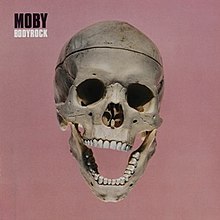Bodyrock (song)
| "Bodyrock" | ||||
|---|---|---|---|---|
 | ||||
| Single by Moby | ||||
| from the album Play | ||||
| B-side |
| |||
| Released | July 12, 1999 | |||
| Recorded | 1998 at Moby's home studio (Manhattan, New York) | |||
| Genre | ||||
| Length |
| |||
| Label | ||||
| Songwriter(s) | ||||
| Producer(s) | Moby | |||
| Moby singles chronology | ||||
| ||||
| Music video | ||||
| "Moby - Bodyrock (Fire Version)" on YouTube | ||||
"Bodyrock" is a song by American electronica musician Moby. It was released as the third single from his fifth studio album Play on July 12, 1999.[3] Heavily inspired by hip hop music, the song incorporates vocal samples from "Love Rap" by Spoonie Gee and the Treacherous Three. The single peaked at number 38 on the UK Singles Chart.[4]
Background and composition
[edit]"Bodyrock" incorporates vocal samples from "Love Rap" by American hip hop artists Spoonie Gee and the Treacherous Three.[5] Moby sampled the song from his first mixtape, "maybe in 1981, off of the Mr. Magic Show on WBLS."[6] The main guitar line on "Bodyrock" was inspired by that of "What We All Want" by British post-punk band Gang of Four.[6] Moby's production also incorporates orchestral elements, and he found it "kind of funny to have an orchestral chorus on what is essentially a hip-hop song."[6] American rapper Nikki D performs additional vocals on the song.[5]
In a review of Play, John Bush of AllMusic notes "Bodyrock"'s big beat elements and writes that its "similarities to contemporary dance superstars like Fatboy Slim and Chemical Brothers are just a bit too close for comfort."[7] Moby later recounted that both of his managers tried to convince him not to include the song on the album, as they found it "really tacky" and "thought it sounded like a Fatboy Slim ripoff—which I guess it kind of did," but that he himself liked the song due to the personal significance of the "Love Rap" sample to him.[6]
Music videos
[edit]Three music videos were produced for "Bodyrock". The version released in the United Kingdom, directed by Fredrik Bond, features a man frenetically dancing in an urban setting while Moby looks on. During the video, Moby acts as an effects man, turning on a wind machine and later a flame bar, accidentally blowing up a nearby car. An alternate second cut was later released, featuring audition footage of dancers supposedly auditioning for the video; the video can be seen two ways: one with only the dancers, and one intercutting to Moby.
The third version, directed by Steve Carr and released in the United States, features Moby wearing a special pair of sunglasses that allows him to see dancers wherever he goes. Hip hop group Run-DMC make a cameo appearance in the Carr-directed version.
Track listing
[edit]
|
|
Charts
[edit]| Chart (1999–2000) | Peak position |
|---|---|
| New Zealand (Recorded Music NZ)[8] | 20 |
| Scotland (OCC)[9] | 36 |
| UK Singles (OCC)[4] | 38 |
| UK Dance (OCC)[10] | 7 |
| UK Indie (OCC)[11] | 3 |
| US Alternative Airplay (Billboard)[12] | 26 |
| US Dance Club Songs (Billboard)[13] | 6 |
| US Dance/Electronic Singles Sales (Billboard)[14] | 17 |
References
[edit]- ^ Breihan, Tom (May 17, 2019). "Moby's 'Play' Turns 20". Stereogum. Retrieved April 15, 2020.
- ^ Breihan, Tom (May 17, 2019). "Moby's Play Turns 20". Stereogum. Retrieved April 15, 2020.
- ^ "Body Rock [CD 2]". United Kingdom: Amazon. Retrieved February 25, 2018.
- ^ a b "Official Singles Chart Top 100". Official Charts Company. Retrieved June 17, 2015.
- ^ a b Moby (1999). Play (liner notes). V2 Records. 63881-27049-2.
- ^ a b c d Weingarten, Christopher R. (July 2, 2009). "'Play' 10 Years Later: Moby's Track by Track Guide to 1999's Global Smash". Rolling Stone. New York. Archived from the original on February 3, 2013. Retrieved May 10, 2013.
- ^ Bush, John. "Play – Moby". AllMusic. Retrieved February 25, 2018.
- ^ "Moby – Bodyrock". Top 40 Singles. Retrieved September 27, 2011.
- ^ "Official Scottish Singles Sales Chart Top 100". Official Charts Company. Retrieved 4 June 2015.
- ^ "Official Dance Singles Chart Top 40". Official Charts Company. Retrieved 4 June 2015.
- ^ "Official Independent Singles Chart Top 50". Official Charts Company. Retrieved November 10, 2018.
- ^ "Moby Chart History (Alternative Airplay)". Billboard. Retrieved June 17, 2015.
- ^ "Moby Chart History (Dance Club Songs)". Billboard. Retrieved June 17, 2015.
- ^ "Moby – Awards". AllMusic. Archived from the original on March 26, 2013. Retrieved March 17, 2013.
